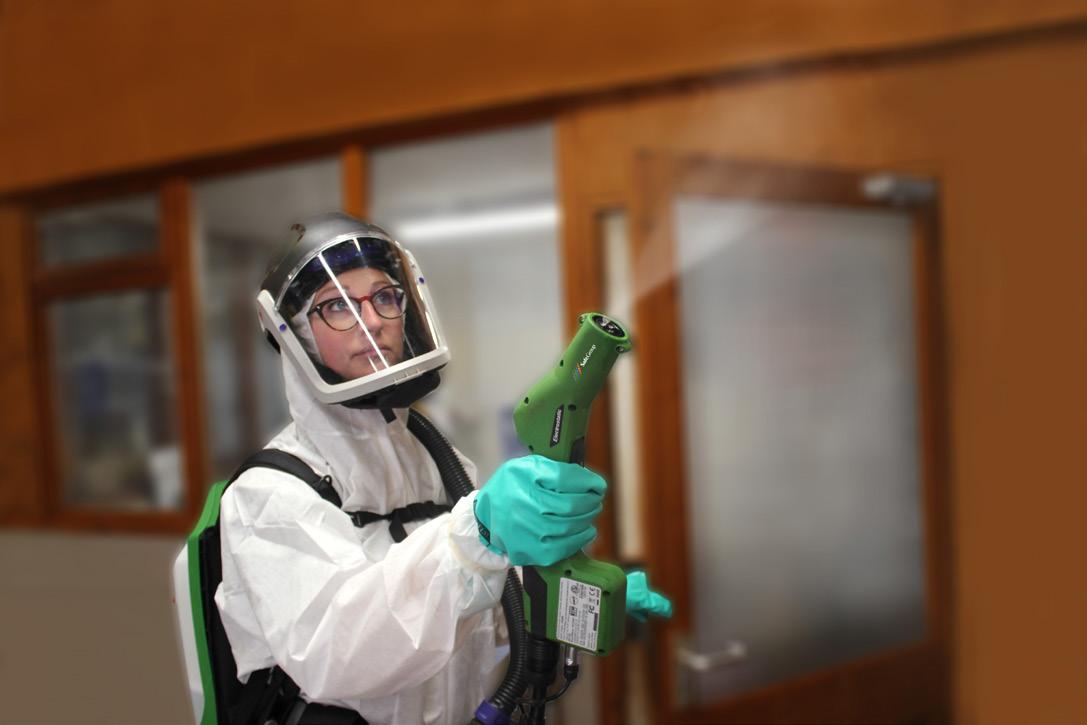
30 minute read
SafeGroup sees Spotless opportunity for growth in South West
News SafeGroup sees Spotless opportunity for growth in South West
National soft FM and waste management specialist SafeGroup Services has expanded its network with the acquisition of Dorchesterbased cleaning company Spotless Cleaning Solutions.
The deal gives SafeGroup an experienced and skilled team of cleaning professionals and a well-established set of clients, along with a new base to expand services in South-West England.
Janet Nash, who established Spotless Cleaning Solutions in 2011, has been working with SafeGroup to ensure a seamless handover. She now plans to focus on her work as a training consultant.
SafeGroup Managing Director Mike Drake said: “We’re delighted to have acquired Spotless Cleaning Solutions, which is a wellestablished and well-run business with an excellent workforce and reputation.
“We have a clear and focused strategy to expand SafeGroup. Taking on Spotless Cleaning Solutions fits it perfectly. It allows us to extend our network, improving the efficiency and sustainability of service delivery in the south west.
“This will benefit the customers of both businesses and allow us to introduce our unrivalled portfolio of planned and reactive specialist cleaning and waste services to many new customers. I hope, also, that it means we can create more jobs as the company’s expansion plans develop in the region.”
Janet Nash said: “This represents an exciting step for Spotless Cleaning Solutions, its dedicated team and, most importantly, for its customers. It’s good to know the business is in safe hands and customers will continue to receive excellent service.”
SafeGroup’s services include COVID-19 disinfection, flood and fire cleaning, crime scene cleaning, specialist floor treatment, hazardous waste removal, fly-tip removal, wait and load waste collection, and food waste collection.
Acquisition of Spotless Cleaning Solutions expands the company’s depot network to five locations, joining sites in Coulsdon, South London, Cannock, Staffordshire, Eccles, Greater Manchester, and Livingston in Scotland.
SafeGroup, founded in 2005, achieved a turnover of £7.8m in 2020, up 30% on the year before, and forecasts that figure to increase by 9% to £8.5m in 2021.
During 2020, it has developed industry-leading COVID-19 disinfection services, supporting retail, manufacturing, commercial and transport customers across the UK, giving existing and new clients the specialist support they need in this important area of cleaning.
Spotless Cleaning Solutions services, delivered to customers in Dorset, Somerset, Wiltshire, and parts of Hampshire, include biohazard cleaning, builders cleans, contract cleaning and sanitation solutions.
These will now be greatly expanded to include all SafeGroup services. This provides Spotless Cleaning Solutions customers with the opportunity to access a comprehensive and integrated portfolio of specialist cleaning and waste services with industry-leading response times and service standards.
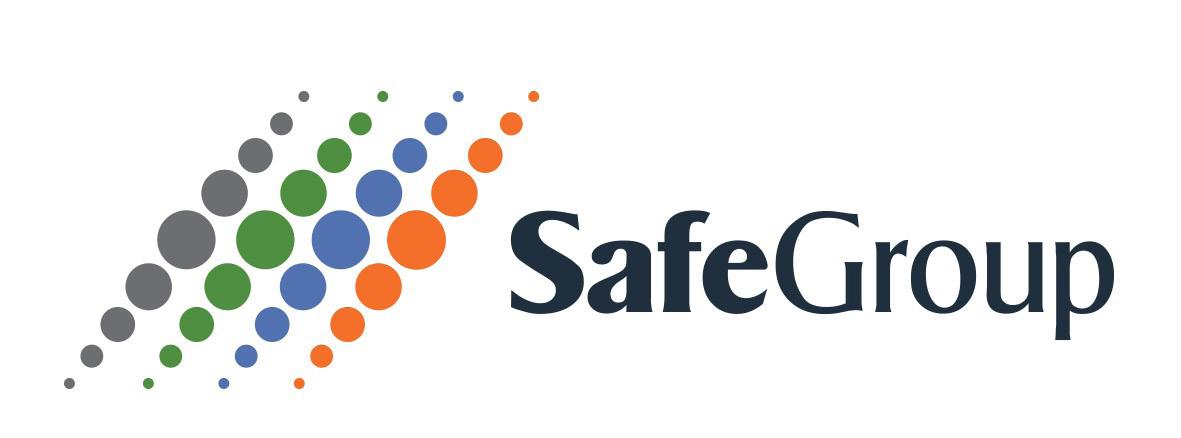

News Something young people can rely on – the CHSA’s 2021 Undergraduate Bursary
Young people may not yet be certain of the detail of what’s replacing A’ Levels this summer but there is one thing they can rely on – the Cleaning & Hygiene Suppliers Association’s (CHSA) Bursary.
“Young people are living in an uncertain world,” said David Garcia, Vice President and Treasurer of the CHSA and the driving force behind the Association’s Bursary programme. “The past 12 months have been incredibly challenging for them, with continual changes to their schooling. We know there will be no A’ Levels but we still don’t know the detail of what will take their place. In the midst of this uncertainty, young people can depend on our Bursary. Our commitment to supporting talented young people remains unwavering.”
Every successful applicant is awarded a maximum of £4,500, receiving the Bursary in three instalments, £1,500 at the start of each academic year or for the first three academic years if the degree is longer. Only ‘would be students’, who are the children of CHSA members’ employees, will be 18 years of over on 1 September 2021, and commencing their higher education studies this autumn are eligible to apply.
David continued: “People working in the cleaning and hygiene sector are the unsung heroes of this pandemic, supplying the PPE and cleaning and hygiene products so essential for keeping workplaces safe. It’s a particular pleasure this year to give something back through this Bursary for the children of our members’ employees.” 2021 is the sixth year since the scheme was re-introduced the CHSA has awarded the Bursary to talented young people. Four young people have already completed their studies with the support of a CHSA Bursary. Seven are current recipients, two of whom graduate this summer. Together they will have received £49,500 from the CHSA by the end of their studies.
Applicants are assessed according to need, worthiness, endeavour, and overall performance. Each candidate also brings something unique, their ‘x-factor’.
Applying is simple. Eligible young people need to visit the CHSA website and click on the link on the 2021 Bursary page. The form includes a 400-word statement and it is advisable to draft the statement prior to accessing the form.
The closing date for applications is 25 June 2021. Shortlisted applicants need to be available to meet the judging panel, to be led by CHSA Vice President David Garcia, on 21 July 2021.
www.chsa.co.uk

News Why outsource your FM
Are there benefits to outsourcing your FM? Let’s look at some common problems many businesses experience and share some thoughts on how outsourcing adds real benefit to organisations. Cost savings and compliance
A key driver for many organisations is compliance. They know they need to be compliant and they can’t afford not to be, but they often don’t feel as though they have the skills or time to be on top of this when faced with ever changing rules and regulations. This often means that things can get overlooked causing greater problems in the future. Taking a proactive approach with clients means there are less reactive tasks, repairs can be done there and then saving money. By outsourcing your FM services to professionals this frees up time for you and your business to focus on what you are good at and delivering a great product or service for your own customers.
Another worry is often how to keep track of compliance and have full visibility over your estates? The answer is a CAFM system, this means you can see everything that your FM provider is doing, upcoming works including PPMs and you can log any issues that you need resolving. This ensures you have full control over what’s going on with the added peace of mind that you don’t need to worry too much on a day-to-day basis! Mitigating Risk
Often businesses will find themselves with multiple providers for different services such as cleaning, electrical maintenance, and grounds maintenance. This can cause problems with staff being unable to keep a track of contractors and not being able to establish strong enough working relationships which can result in a breakdown of communication. However, by appointing one provider to deliver all your services you can really maximise how efficient these services are and how they can work for you as a business. Your FM provider should be integral to your business, working alongside your teams as a partnership. Reduce the cost of your energy management
We know from speaking to business that sustainability and energy management is very important but that they often lack staff resource and specialist knowledge this prevents companies from achieving their desired results and impact. By allowing professionals to take away this burden businesses could see considerable cost savings and exceed sustainability


targets through your hard and soft services right through to property management and health and safety.
Using a FM providers indepth knowledge of changing trends in the energy sector, in combination with analysis of utility usage, enables clients to get the best rates from utilities providers and only paying for the energy that they use. At Derwent fm we can work alongside you to create an energy policy, gather your baseline data, conduct an energy performance review and then start to find energy saving opportunities.
We believe it’s important to review your assets and replace with sustainable units. Again, these tasks can be time consuming but extremely worthwhile. As a business, Derwent fm can manage your lifecycle replacement programmes, ensuring you are budgeting appropriately for upcoming years, propose energy efficient replacement products and manage the project works. Impeccable standards & quality
In terms of standards and quality sometimes your business may not have all the expertise needed in house and so outsourcing to companies such as us enhances the quality of your service as we can bring all our expertise and focus to delivery. It is certainly easier to keep up to date with best practice when you are immersed in that industry and this is reflected in the quality FM providers offer their clients. Improved social responsibility
Some businesses can often be worried that working with external partners and outsourcing their services could impact upon their reputation in some way. However, working with a total facilities management such as Derwent FM could improve your social responsibility.
As an example, we reinvest all our profit to regenerate communities by supporting housing and community initiatives. Our social purpose supports our clients CSR strategies and contributes in a positive way to their impact statements.
Clients can often worry about sustainability and ethical implications along the supply chain. FM providers should ensure that potential new suppliers are responsibly sourced and evaluated to guarantee an ethically aware and sustainable approach to the provision of services and products.
Another example is that we are accredited to ISO 14001 and ISO 50001 – with a robust management system in place to monitor and manage our environmental impact and energy consumption, with a focus on continuous improvement and reducing our carbon footprint year on year.
If you would like to find out more about outsourcing your facilities management, please visit www.derwentfm. com or call 0113 531 1000
News Biltong drying success with Condair & JTR
Specialist South African food supplier, The Savanna, is using Condair dehumidifiers to dry its award winning biltong at its production facility in London. Two Condair dehumidifiers were installed by John Todd Refrigeration (JTR) to help in the production of this traditional South African product.
Biltong is a dried and cured meat, with a rich and dense flavour, which is cut into strips and often eaten as a snack. The Savanna’s biltong is produced using grassfed beef from the Scottish highlands and a traditional South African curing method. Silverside beef slabs are sliced into strips and then marinated before being mounted on hooks for air drying, which is where Condair’s dehumidifiers assist in the process.
Matt Gough, Refrigeration Engineer at JTR commented, “The Savanna approached JTR wanting to improve the consistency and efficiency of their drying rooms, whilst also gaining better control over what was happening inside. The rooms need very tight environmental control but the previous strategy introduced outside air to help lower temperatures when needed. This external factor meant that the internal room conditions, and therefore the drying process, were influenced by the seasons and weather.”
“JTR redesigned the drying rooms and installed Condair DC-N dehumidifiers. The dehumidifiers, located in the rooms, both dry and heat the air to the required condition, resulting in a fully sealed area and a consistently controlled drying process.” Matt concluded.
Lisa Gardshol, founder and CEO of The Savanna, commented, “We have been very happy with the performance of the Condair dehumidifiers JTR installed to comply with our drying approach. It has not only allowed us to increase production efficiency but also produce our award-winning biltong. We have full control over the entire process and can make decisions based on the data that we recieve. This is something which we couldn’t do as well before.”
“The Savanna now operates several drying rooms at our London production facility and we are able to monitor the entire activity accurately. During the drying process, the beef will lose around 50% of its weight in moisture loss, so the dehumidifiers are each removing several hundred litres of water per cycle. We’ve found that this ratio leads to the besttasting biltong” Lisa concludes.
As well as manufacturing, The Savanna imports and distributes a wide range of South African food and drink products. It operates eight retail outlets at train stations across London, including Victoria, Liverpool Street and Paddington, and delivers nationwide via its websites at thesavanna. co.uk and m-eat.co.uk.
John Todd Refrigeration specialises in design and planning of bespoke refrigeration installations, which are supported by 24 hour service and maintenance back-up. The Exeter-based company was established in 1998 and serves the food, hospitality and retail sectors.
The Condair DC-N dehumidifiers installed by JTR at The Savanna, are part of an extensive range of dehumidifiers offered by Condair. The company supplies both condensing and desiccant technology, with a wide range of capacities and many pre- and post- drying features, to ensure process air delivery precisely matches an application’s requirements.

The Condair Group is the world’s leading specialist in humidification, dehumidification and evaporative cooling, with technologies for commercial, industrial and heritage applications. The company offers system design, manufacture, supply, installation, commissioning, maintenance and spares. You can find out more by visiting the company’s website at www.condair.co.uk.
MAINTENANCE PACKAGES FOR YOUR SUSTAINABLE ROOF SOLUTION
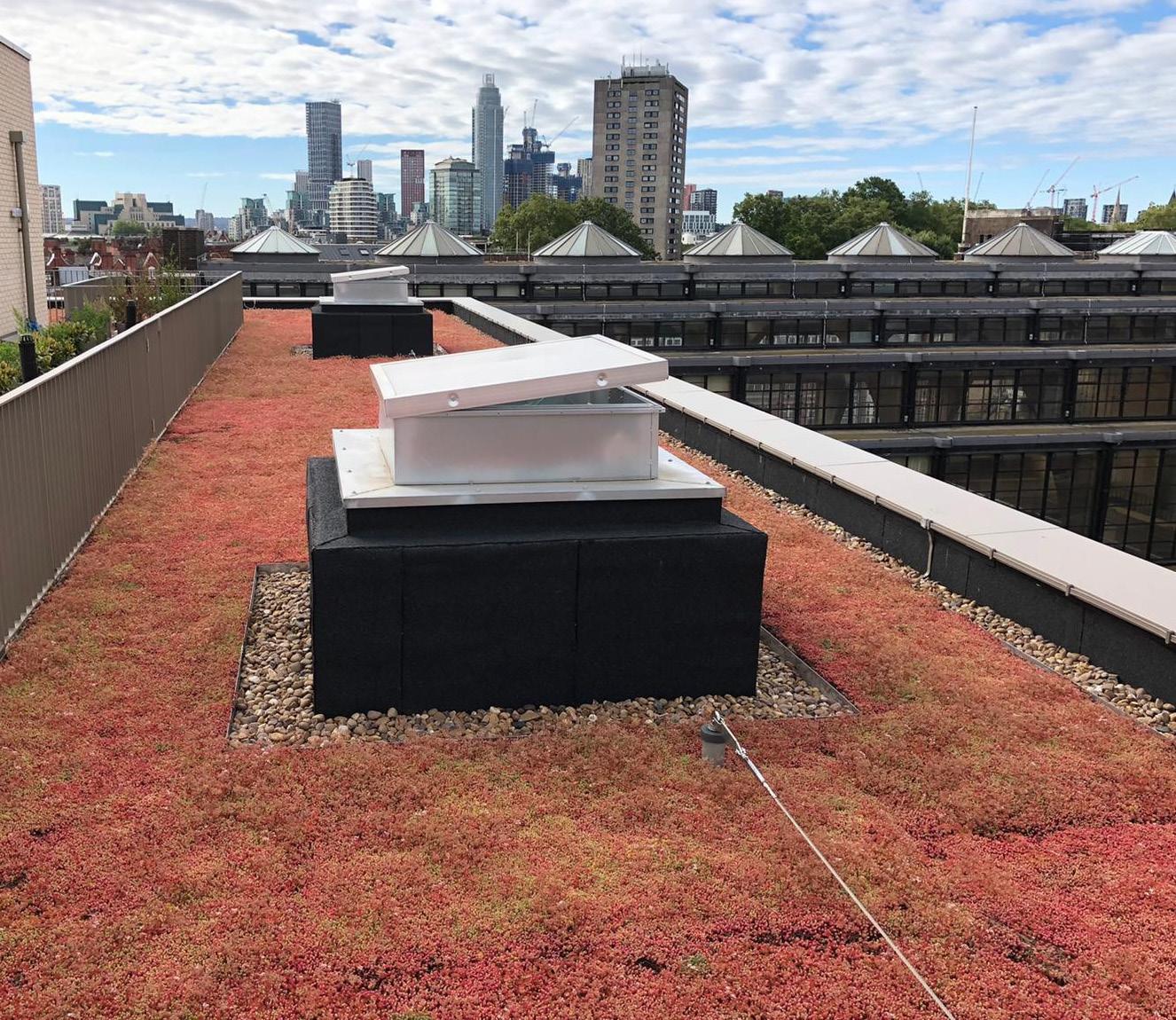
Given the investment made in incorporating a sustainable roof it is important that the system delivers its full life cycle potential of both commercial and environmental benefits. A well-managed and regular maintenance programme will ensure longevity of performance and economic and social return. As part of the maintenance service, Eco Green Roofs Ltd (EGR) will provide a free roof survey that will provide data including recommendations based on requirement - at no obligation. Maintenance packages have been carried out successfully across a diverse range of clients across all sectors including housing, education, healthcare and commercial.
WE MAINTAIN ALL SUSTAINABLE ROOFS
Available maintenance packages include:
• Green roofs including blanket, plug plant and seeds. • Biodiverse roofs including blanket, plug plant and seeds, alongside any present wildlife habitats that encourage self-colonisation • Blue roof systems for rainwater management • Solar panels • Irrigation systems including de-commissioning prior to winter and re-commissioning in the spring
MITIGATE RISK BY CHOOSING AN EXPERT
For peace of mind:
• Decades of experience of designing and installing sustainable roof solutions • Associated to leading health and safety bodies • Maintenance team encompasses fully trained and competent operatives • Take full responsibility and manage all risks • A ‘Guarantee of function’ is available on maintenance packages ensuring the roof achieves optimum environmental benefits and aesthetic qualities*
News Living roofs for sustainable rainwater management
With the UK now frequently experiencing record volumes of rainfall and increasing risks of flooding, building design must be more ecologically and sustainably driven to counteract climatic challenges. Keith Hills, Managing Director at EGR (Eco Green Roofs Ltd) explains how living roof systems can offer a proven solution to managing rainwater drainage in city spaces.
Living or green roof systems have been growing more common as decision makers look to maximise green spaces in urban areas across new builds and retrofitting existing buildings. This includes designs that incorporate increased biodiversity through the creation of new habitats for wildlife. However, green roofs can also play a vital role in managing the impacts of extreme weather and mitigating flooding.
Global environmental change is already impacting the climate of the UK in clear and measurable ways with drier summers and wetter, milder winters. Met Office figures show that since 1998, we have experienced six of the ten wettest years on record. February 2020 saw more than twice the average rainfall for the month - making it the wettest February ever recorded - and capped off the 5th wettest and mildest winter since records began in 1862. According to analysis by the Tyndall Centre for Climate Change Research at the University of East Anglia, UK rainfall will continue to increase in intensity in the coming years as the climate continues to warm.
Therefore, it is now more important than ever that the way our buildings, towns and cities are designed and constructed accounts for these climatic challenges and contributes to minimising the impact. In any area where development has taken place, including some more rural settings, one of the most common contributors to flooding is the presence of hard, impermeable surfaces. Instead of draining away slowly, the rainwater quickly runs off these surfaces and can overwhelm both drainage systems and watercourses leading to flooding. A report for the Committee on Climate Change (CCC) estimated that flooding causes around £1.1bn of damage each year in the UK, just one factor in how flooding can impact people’s lives. Implementing approaches to mitigate flooding aligns with the aim stated in the RIBA Sustainable Outcomes Guide of balancing social, environmental and economic value to deliver a triple bottom line of sustainability.
Sustainable Drainage Systems (SuDS) are key to counteracting the effects of the urban environment and as such, are now a key part of planning policy. The Flood and Water Management Act 2010 requires developments to utilise elements of a SuDS approach to reduce the flood risk, and the current version of the London Plan specifies that new developments
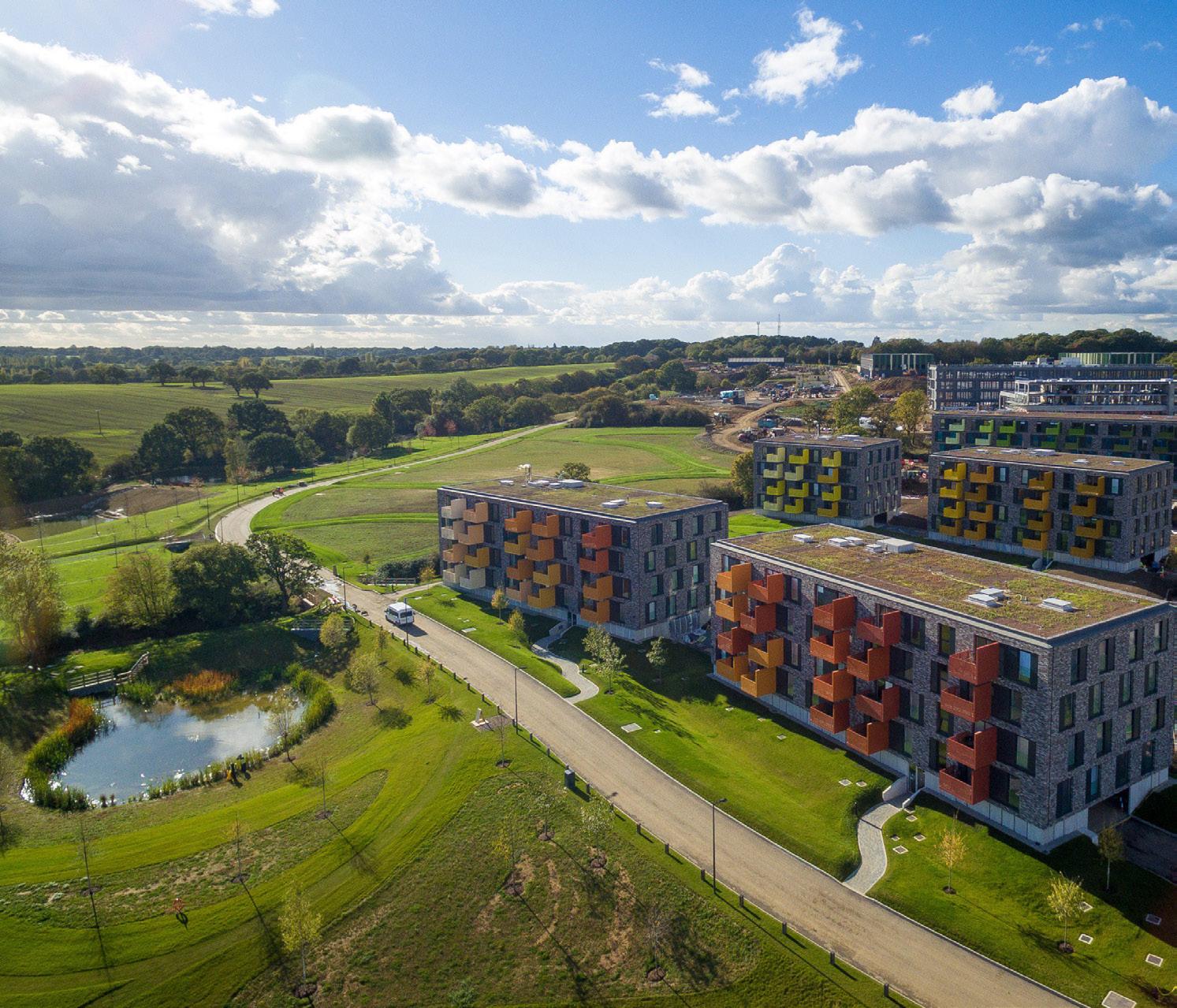
should aim to achieve greenfield run-off rates.
Green roofs have an important role to play in helping to achieve this by intercepting rainfall, providing opportunities for evapotranspiration from the vegetation and the storing of rainwater. These green roof systems can fulfil many of the key aims of the SuDS approach as it helps to manage the water as close as possible to where it falls, reduces the quantity and speed of runoff to prevent flooding and can also act as a filter to limit the pollution present in runoff.
The performance and capacity of the green roof in managing rainwater will depend on a number of factors. These include the type and design of the system, the depth of the substrate, the type of vegetation and the level of moisture already in the soil. The Greater London Authority’s Living Roofs and Walls Report (2019) cites several studies that demonstrate the effectiveness of different roof types. Research carried out in Germany found that extensive green roofs with between 60mm and 100mm of soil can intercept 50% of annual rainfall and intensive roofs with deeper substrates (around 500mm) can intercept up to 90% of the rainfall. Furthermore, a study in the United States found that a green roof with a substrate depth of 89mm delayed the start of roof run-off by 5.7 hours and the peak run-off by 2 hours.
Finally, with so many factors to consider, it is important that the right approach is adopted to ensure the system is seamlessly integrated. This is particularly important when it comes to green roof retrofit, where the installation of a green roof is introduced on top of an existing building. The building initially was designed with a certain amount of load bearing weight, and therefore before a green roof is considered, the building needs to be extensively examined to determine whether its structurally capable in enduring additional weight. Other aspects include the current condition of the waterproofing, and an environmental analysis of the conditions at roof level to determine the ideal species that will flourish and thrive.
Therefore, engaging with the right specialist partner who can provide technical advice and guidance on a full range of systems is essential. The chosen supplier should also comply with best practice schemes such as the Green Roof Organisation (GRO) Code of Practice and FLL guidance as due to the living components, expertise in design, installation and maintenance is crucial to the success and longevity of the roof.
In addition, a blue roof is a system engineered to store rainwater and release it in a controlled way to limit the impact of heavy rain. This can be a standalone system or be integrated with a green roof element where the rainwater store can irrigate the vegetation.
Green roofs are important to the future of our villages, towns and cities, not only as a way of creating much needed green spaces for both people and wildlife but in helping to mitigate the impacts of climate change. Working with an experienced and specialist supplier will help ensure that the value added by the living roof system can be maximised.
To discuss a retrofit opportunity, contact the EGR team at info@egr.co.uk or to read more about its full service offering including green, blue and solar roof solutions and case study examples, visit www.egr.co.uk.
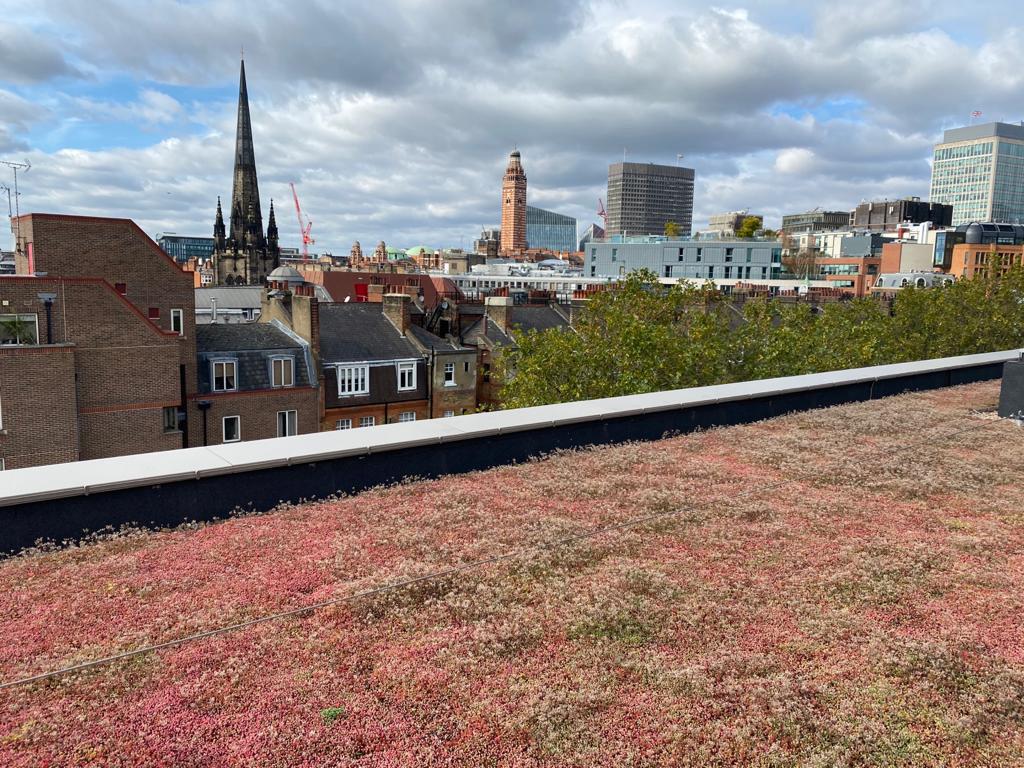
News Reviewing Building Safety in Specialised Housing
Ensuring the safety of residents and staff in specialised housing environments has always been a priority for those in the sector. Karen Trigg of Allegion UK highlights the steps decision makers must make to keep occupants in sheltered, extra care or supported housing safe and secure.
Whether it’s adhering to fire safety or infection control guidelines – a topic that is never far from our thoughts at the moment – there are many options that decision makers can take to ensure maximum safety and compliance in specialised housing settings.
Only recently, the pandemic has left facilities such as care homes and their staff under scrutinity over their infection control methods. And now, with the winter period playing a role in the spread of common colds and such, infection control, along with the safety of occupants, is rife in the news. So with that in mind, what are the steps that must be taken to ensure occupants in supported housing stay safe and secure?
Providing a safe environment for all doesn’t have to be a complex process, although it is important that the process is thorough, with occupants in these settings potentially far more vulnerable to injury or worse in the event of a fire. The same is true for infection control, where robust policies and protocols should be in place to protect those living in supported housing, as well the staff looking after them. Fire Safety
The National Fire Chiefs Council’s (NFCC) comprehensive guide for specialised homes, published in 2017, includes many proprosals, all designed to protect the estimated three quarters of a million residents situated in specialised housing in the U.K.
Further to this, in January 2020, the Scottish Government strengthed its response to fire safety – the Practical fire safety for existing specialised housing and similar premises: guidance – which is aimed at housing and care providers, as well as care regulators and care service commissioners.
Both reports detail ways in which specialised homes should work to minimise fire risk to protect both the people living, working and visiting there, and the building itself.
Examining the statistics surrounding fire safety in these environments, it’s unsurprising that it remains a priority. According to the NFCC report, sheltered and extra care housing accounts for about 2% of housing stock, but between 2010 and 2016, they accounted for about 7% of fires – a critical finding.
From this, London Fire Brigade’s eight-page document distilled the main information and includes a person-centred fire risk assessment checklist and a list of the main fire safety management procedures, such as testing fire doors and fire alarms, record-keeping and essential maintenance. Crucially, fire doors and their appropriate door hardware, such as mechanical and electromagnetic closers and panic emergency exit hardware, must be fitted correctly and regularly checked to ensure these heavily used products are fit for purpose.
However, key for specialised housing, it’s important to remember that there is no one-size-fits-all solution to fire safety products. Residents for example, must be comfortable using fire doors and their hardware, thus removing the risks associated with heavy or non-functional doors that residents in these settings
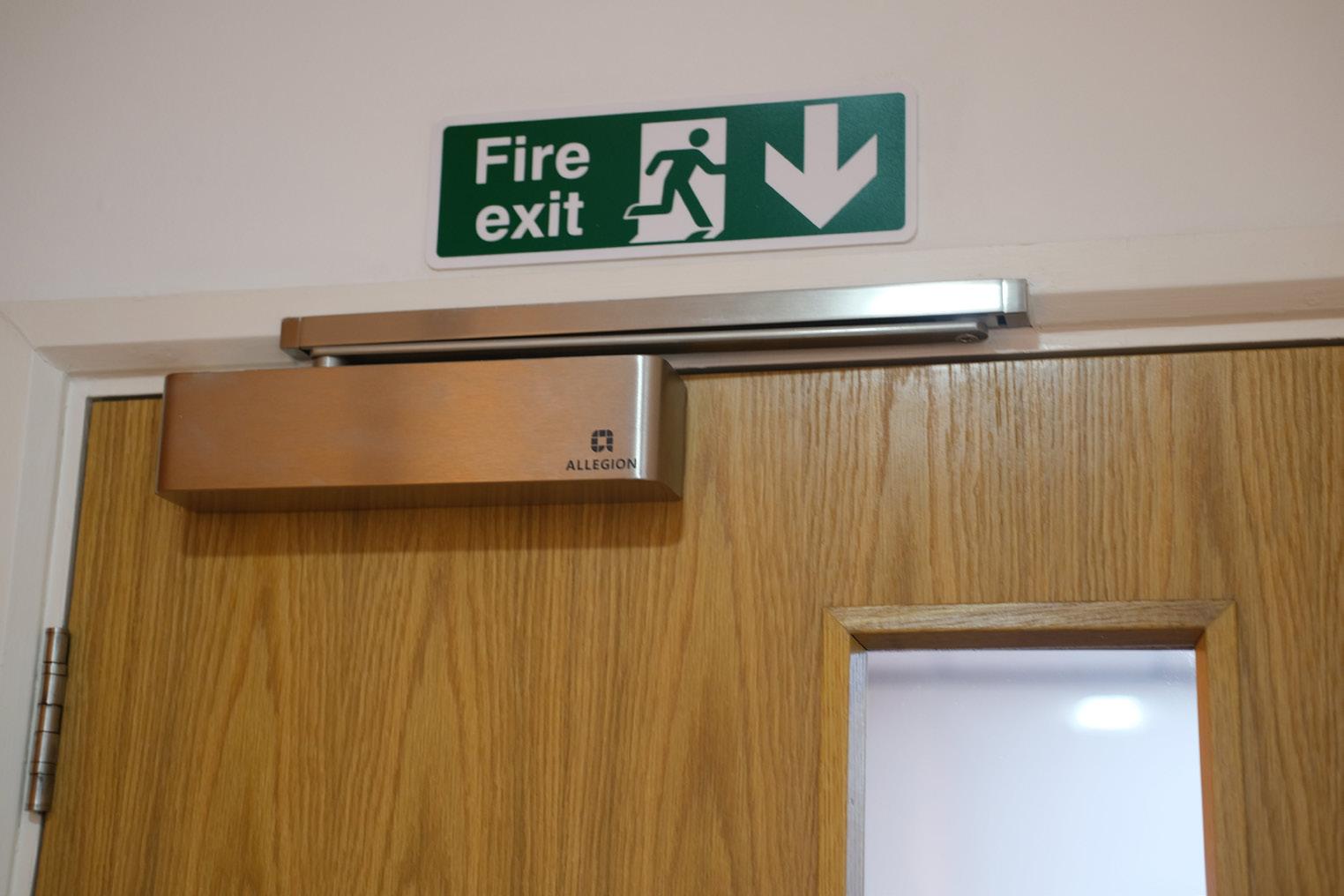

may have additional problems operating. Decision makers are advised to consult a door hardware expert, who will provide further guidance as to the products that will best meet the needs of a speficic facility. These experts consider such issues as assessing the emergency access and egress systems, as well as establishing how best to accommodate the needs of all occupiers and staff. Infection Control
Infection control has long been front and centre of people’s minds – and never more so since the Covid-19 pandemic, which highlighted the endemic risks in all commercial, healthcare, domestic and care home settings.
In 2018, a report conducted by Allegion UK revealed that while 80% of infections are transmitted through the enivornment, only 71% of healthcare facilites used environmental cleaning to prevent the spread of infection. Furthermore, just 52% of healthcare respondents said they were satisfied that their existing infection control measures were robust and effective.
The potential for exposure to pathogens is significant within specialised home settings. While hand washing and disinfection protocols, as well as ventilation procedures, all form an important part of infection control, there are additional measures that can be taken, such as installing antibacterial door hardware, handles and levers in high-traffic areas.
These solutions contain added antibacterial protection to help eliminate potentially harmful bacteria and defend against the spread of microorganisms. In an environment where health risks are more probable, this provides extra peace of mind when it comes to maintaining the highest levels of hygiene and minimising the risk of contamination.
It’s also key to observe the building’s emergency exits. Emergency exit devices can also be coated with antibacterial properties, contributing to both fire safety standards and now infection control, by reducing the risk of cross-contamination, providing long-lasting protection and enabling people to escape a building quickly. Furthermore, touchless electromagnetic door controls can assist with ease of movement, fire safety and infection control by being linked to the building’s alarm system, closing shut in the event of a fire and eliminating the need for people to wedge the doors open. Taking Responsibility
In what is now a critical time for many specialised housing facilities, decision makers must take responsibility in their choices to help meet both the fire safety and infection control requirements that have been set.
While it’s true that the varied nature of running sheltered, extra care and supported housing facilities can make decisions feel like complex challenges, today’s hardware solutions provide one helpful and easy solution, enabling higher levels of building safety and security – and that, in the current environment, is more important than ever.
News BMS solutions provider prepares for next stage of growth with new Group structure & rebrand
Leading building management solutions company BG Energy Solutions has today announced a major rebrand to BGES Group as it divides the specialist elements of its business into four separate entities.
The new organisational structure has been designed to better support the awardwinning business’ expansion plans following a period of sustained growth. It will also give greater clarity to customers on the company’s defined service offerings.
Sitting beneath the umbrella brand of BGES Group, the new structure comprises BG Projects, BG Service, BG Net-Zero and BG Enterprise. BG Projects will concentrate on the delivery and development of all project related works including BMS design, panels and installation; while BG Service will concentrate on providing ongoing remote and field support and maintenance packages for clients.
The newly-formed BG Net-Zero specialises in energy management and carbon reduction, supporting organisations on their journey to net-zero. BG Enterprise will support the group for all ICT, network architecture and managed service provider (MSP) requirements.
A new visual identity adds strength to the rebrand, bringing a fresh look and feel to the Group’s marketing collateral. Each sub-brand is clearly identifiable by its own unique colour and strapline. Customer-centric delivery
While each business unit complements the other, the separation of the entities enables a more strategic and customer-centric approach to service delivery. It allows each team to hone in on its core specialism, delivering exceptional outcomes for customers. The rebrand will also facilitate the Group’s future plans as it grows into new areas of expertise. 2020 saw Sheffield-based BGES Group undergo significant expansion, with the addition of 16 new members of staff and the forging of several strategic partnerships, including an agreement with OakTree Power to provide demand side response services. The business also celebrated its 25 year anniversary, and further expanded its London office, which was established in 2019 to meet growing demand in the South of England. Values maintained

Despite its growth, the BGES Group remains as committed to retaining its core values, including a strong focus on investment in its staff to create a culture of knowledge, passion and innovation. The company prides itself on providing training opportunities for employees, and over half of the team are currently on long-term professional development courses.
Gareth Barber, Managing Director of BGES Group comments:
“Our new business structure and rebrand marks an exciting new chapter of growth for the company. It also strengthens our position as experts in building management solutions for a low carbon and connected world.
“We’re on a mission to make buildings as smart, secure, comfortable, healthy and efficient as they can be. It’s vital that we organise our business to support the built environment supply chain in achieving these goals.
“We have no doubt that this provides us with the strong foundation we need to start the next stage in our journey. From a client perspective, we have never been better placed to deliver services in a more highly focused way, led by specialist teams who are passionate about what they do.
“I’m very proud of what we’ve achieved together over the past few years. Our new brand identity better reflects our distinct offering and also creates a pathway for us to diversify into different areas in the near future.”
News Protecting Your Employees When Returning to the Workplace
COVID-19 has changed the way managers think about office facilities; as workers shifted to working from home, these managers have wrestled with ways of keeping staff safe on their return to the workplace.
Some advocate unrealistic measures, like blocking off huge swaths of an office building, or attempting to create traffic flow patterns by taping off access to areas. Some look to eliminate conference rooms or common areas. But others look to significantly reduce risks by addressing the source of aerosol transmission of pathogens and viruses—indoor air.
It’s been acknowledged by many leading scientists that the novel coronavirus is primarily transmitted via aerosolized droplets in the air, when an infected person coughs or sneezes.
What’s more, those droplets linger in the air and stay active and infectious on surfaces. That’s why so many experts advise people to wash their hands frequently. But in close quarters of office buildings, where stale air is recirculated, it’s difficult to remain contaminant-free.
HVAC and opening windows may not be the magic solution
Some facility managers look to existing HVAC systems as a potential solution, but many of the existing systems aren’t designed to handle more air exchanges per hour, thus providing less fresher air. And, installing HEPA filters in the HVAC system’s air intake vents isn’t a solution either,

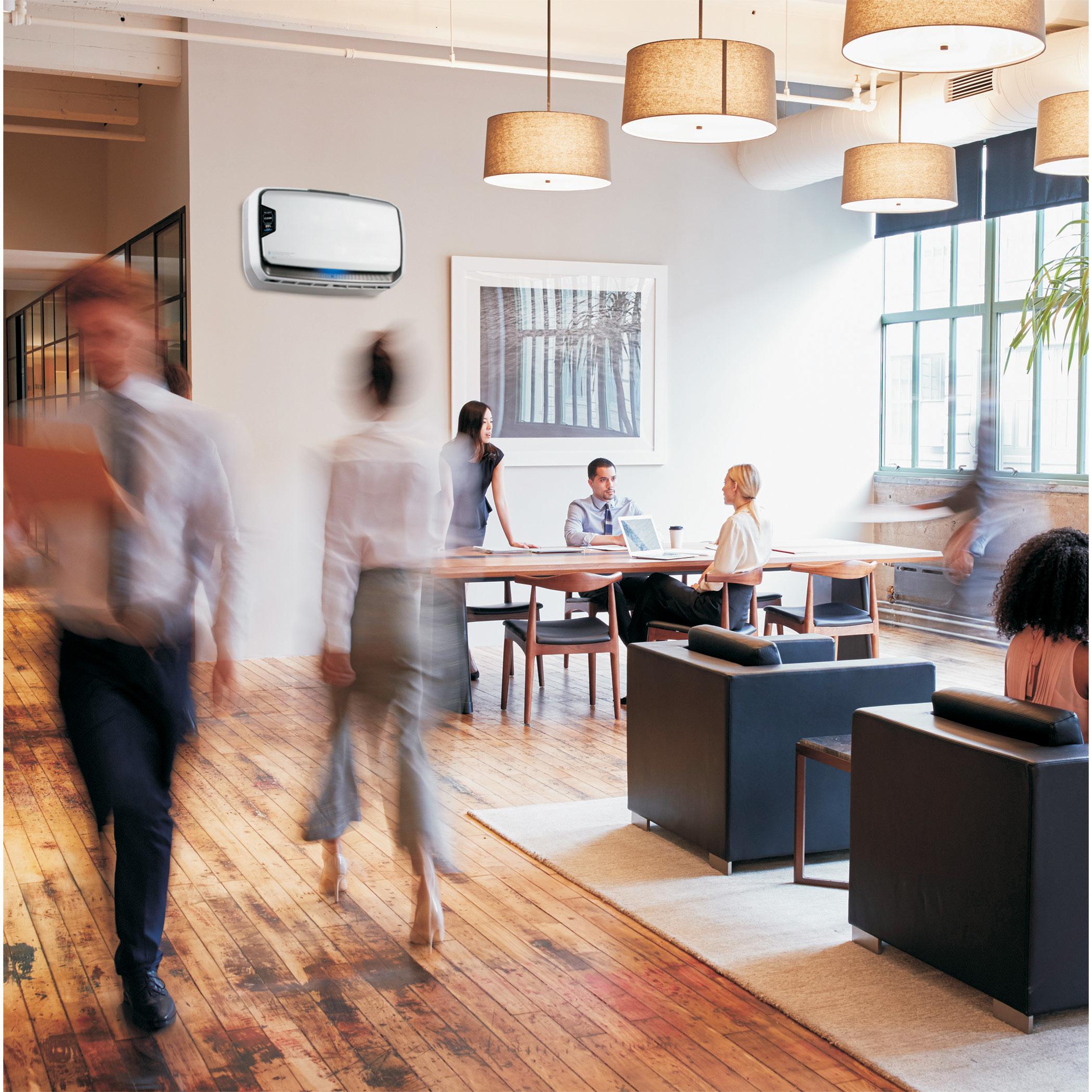
since these thicker filters drag down the airflow and efficiency of the system, resulting in even less circulation.
As a side note, these thick filters often cause managers to increase the amount of time systems run, decreasing system life expectancy because parts work overtime to keep up with demand. And, as you will be aware, constantly running HVAC systems results in higher energy bills.
Opening windows for fresher air is a non-starter in a number of instances. Many modern office buildings looked to provide HVAC systems with an “airtight seal,” making windows non-operable for the sake of energy conservation. So, many returning workers can’t even open windows.
One option that is proving extremely popular with many leading education institutions, healthcare centres and corporate building owners is the installation of air purification with HEPA filtration.
One of the market-leading companies is Fellowes, manufacturers of the renowned AeraMax Professional. These commercial-grade air purifiers use four-stage air filtration with True HEPA filters to effectively and efficiently remove up to 99.97 per cent of airborne contaminants, like viruses, the flu, bacteria, allergens and odours from indoor air.
A computational fluid dynamics study showed just how effective the placement of AeraMax Professional air purifiers can be in enclosed spaces. Computation Fluid Dynamics uses highly accurate computer modelling to showcase how “fluid” moves through spaces, and how AeraMax Professional units would remove the contaminants in the air and at what rate, in real time. That way, office managers and building owners could see how the purifiers work before purchasing them.
Clearly, the pandemic has changed business forever. But, in some ways, it has shed light on new, healthful practices that can benefit people in the long run…like focusing on indoor air and cleaning it with AeraMax Professional.
For more details on Fellowes AeraMax Professional air purifiers, visit: https:// aeramaxpro.com/uk/ or contact Tim Browning by emailing: tbrowning@fellowes.com
Bringing your places to life
A FLEXIBLE APPROACH TO TOTAL FACILITIES MANAGEMENT
We offer the full package or a tailored selection of services that suit your business. A stand out company who excel in facilities management
Derwent fm offer an holistic and completely flexible approach to facilities management: one that delivers outstanding service and professional expertise in all areas. We have all your needs covered, no matter what service you require, and keep all project costings transparent throughout. Our experience and portfolio allow us to really understand the needs of our clients, provide expert advice and deliver a professional service with consistent results.
Speak to us today to find out more.
0113 531 1000 enquiries@derwentfm.com www.derwentfm.com
News First Impression Techniques workshop launched by five-star front-of-house team
Specific training to support businesses who want to upskill their front of house representatives to support authentic connections with customers even whilst wearing a face mask.
Acuity, the five-star frontof-house service provider and sister company of Axis Security, is delivering a twohour online workshop to offer tips and insights on techniques aimed at improving overall first impressions within a professional environment.
The online workshop which has been designed for security officers and front-ofhouse staff, will be hosted both on the 17th of February and the 25th of February between 11am and 1pm.
The topics to be discussed will range from insights on how to establish a successful and positive first impression, to the importance of aligning focus, physiology and language in order to build a more ‘genuine’ experience of the business.
Attendees will also learn techniques on how to present a professional image through body language and posture, and how to still create a positive impression from behind a face mask. Insights will similarly be given on how even a slight change in attitude can strengthen relationships with colleagues and customers.
Chiara Di Rienzo, Acuity Director, says first impressions are fundamental to establishing strong and lasting relationships in a professional context. “The first impressions that you get when arriving at a business location often mirrors the ethos of a company, so it is important that it is the right first impression that a business makes.
“Through our First Impression Techniques workshops we want to provide all the knowledge and skills needed for people, who are instrumental in helping visitors form a positive image of the business they are visiting, to confidently create a positive first impression for that business.
“COVID-19 has affected everyone’s way of working, so we hope these workshops will provide additional support to help people overcome the barrier of wearing a face covering when part of their job is to create authentic connections with customers and employees. Overall, we hope our workshop will provide further help to all those businesses seeking to improve their professional image.”
For more information or to register for one of the online workshops visit www. acuity-services.co.uk/fit







